- About Ramapo
- Academics
- Admissions & Aid
- Student Life
- Athletics
- Alumni
- Arts & Community
- Quick Links
- Apply
- Visit
- Give
Children of the Holocaust
Are you a child of a Holocaust survivor?
 In summer 2025, the Center for Holocaust and Genocide Studies (CHGS) at Ramapo College convened two roundtable meetings for the children of Holocaust survivors. We sought insight into the needs of this important and underserved cohort and advice regarding the types of programs they desire most. This work increases in significance daily, as the survivor generation sadly, if inevitably diminishes in numbers.
In summer 2025, the Center for Holocaust and Genocide Studies (CHGS) at Ramapo College convened two roundtable meetings for the children of Holocaust survivors. We sought insight into the needs of this important and underserved cohort and advice regarding the types of programs they desire most. This work increases in significance daily, as the survivor generation sadly, if inevitably diminishes in numbers.
We welcome new members to join our growing group, participate in our events and workshops, and advise about the scope of programs we will offer in the future. Please email holgen@ramapo.edu for more information and to participate.
CHGS hopes, in the future, to build upon these programs to serve other communities touched by genocide and generational trauma in a manner suited specifically to them. If you belong to such a community and would like to partner with CHGS, please email Dr. Jacob Ari Labendz at holgen@ramapo.edu.
Five-Part Workshop for Children of Survivors
Presenting Your Family’s Survival Story
Sign Up Now
(Only five spaces remain)
This five-session workshop, led by Peter Nelson, is designed to help children of Holocaust survivors tell their survivor-ancestor’s story (and their own) to audiences who could benefit from the telling. The course advises on structure and teaches storytelling techniques. It draws attention to the individual (the family member and the narrator) over statistics and abstractions. By optimizing storytelling and making it personal, the goal is to affect listeners with the hope of having them change their thinking, feelings, and actions moving forward.
Qualify for our speakers bureau!
Let’s Talk
A Semi-Structured Discussion Circle for the Children of Holocaust Survivors
Join us for our first meeting on October 21, 2025 from 12:00 – 2:00 pm
In-person only at Ramapo College / RSVP to holgen@ramapo.edu
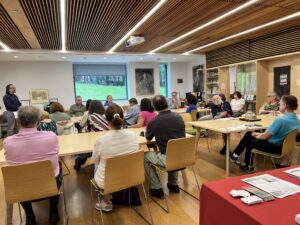
Meetings will be led by Dr. Marshall Harth, a member of our “Children of the Holocaust” group and a retired professor of clinical psychology at Ramapo College. Lori Myers, a member of our group and a professor at Ramapo, will also join to share her expertise in working through Holocaust legacies through literature and theater.
A light lunch will be served. Email in advance with dietary restrictions or commitments.
Upcoming Events of Interest
Foundational Concepts: Holocaust Trauma and Postmemory
Dr. Marianne Hirsch, Columbia University
September 18, 2025 at 5:30 pm
Trustees Pavilion 1 or via Zoom with Registration
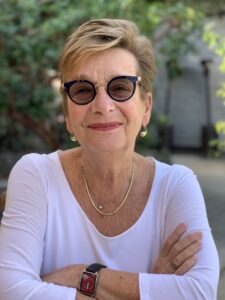
In this lecture, Marianne Hirsch will discuss how her thinking about the intergenerational transmission of memories of violent histories has shifted, particularly after October 7, 2023. Hirsch’s conceptualization of what she has called “postmemory”—based on family memories of surviving the Holocaust– initially focused on the inheritance and perpetuation of trauma. In this talk, she will explore the reparative potentials of memory through the work of several artists who open-up the past and reframe its debilitating legacies. Memory art, Hirsch will suggest, can become a transformative practice of communal repair and a platform of social solidarity.
This is part of our Foundational Concept Series, which re-introduces the foundational terms and concepts of Holocaust and Genocide Studies with specific attention to new trends and emerging perspectives.
Only for the Children of Survivors
Music and Art Created In Ghettos and Concentration Camps:
Intergenerational Emotional and Existential Revelations
With Holocaust musicologist, viola recitalist, and educator, Dr. Tamara Reps Freeman
November 4, 2025 at Ramapo College from 2:00 to 4:30 pm
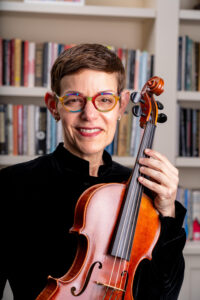
Dr. Tamara Reps Freeman, Holocaust musicologist, recitalist and educator, pulls back the emotional and existential curtain of Holocaust history through the exploration of music and art created in the ghettos and concentration camps. Archival artistic expressions gave voice to the voiceless, helping prisoners to process myriad emotions, including despair, hope, courage, resilience, and courage. Participants’ voices reflect on their own emotions, drawing life lessons for our world today and for the future.
This program is open only to children of Holocaust survivors. Students from Dr. Jacob Labendz’s course, “Paradigms of Genocide,” may also play a role in the program.
RSVP to holgen@ramapo.edu by October 22, 2025
Holocaust and Genocide Education Today:
Challenges and Opportunities
November 17, 2025 at 5:30 pm
Friends Hall or via Zoom with Registration
Our Panel of Experts
Colleen Tambuscio, CHGS Pedagogy Programs Administrator
Brianna Doherty, Managing Director of the NJ Commission on Holocaust Education
Yasmine Beverly Raba, Local Teacher and Playwright
Moderated by CHGS Director Jacob Ari Labendz
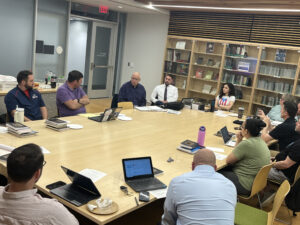
Graduating senior, Stefanie Viera, presents her research on transitional justice after the Guatemalan Genocide—conducted with Dr. Labendz—to our roundtable.
Holocaust and genocide education are at a crossroads. CHGS has gathered three expert practitioners to discuss the challenges, opportunities, and future of Holocaust and genocide education in our region. We face multiple issues, including the inevitable passing of the survivor generation, a recent spike in antisemitism, the deployment of the Holocaust as a symbol in contests and debates over Israel, Palestine, and Gaza, and longstanding tensions regarding the status and legacies of the Holocaust as a singular, unique event of Jewish history or as human event with universal implications. CHGS continues to expand the services we offer to educators and schools in and beyond our region to help them navigate these waters. Please bring your questions!!!
Copyright ©2026 Ramapo College Of New Jersey | Statements And Policies | Accessibility | Contact Webmaster.
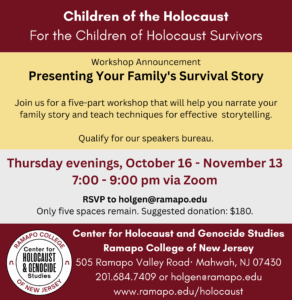

Follow Us!